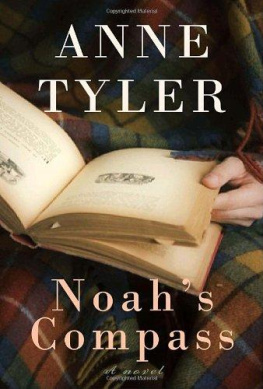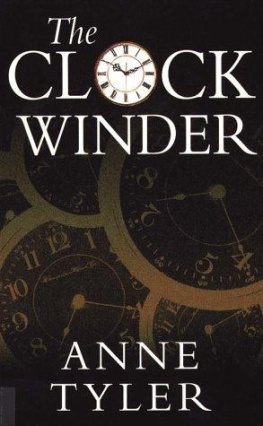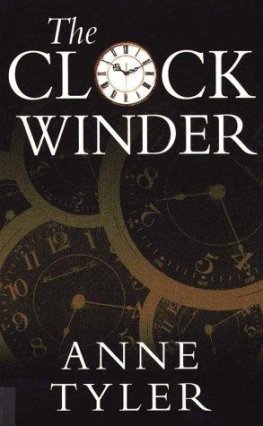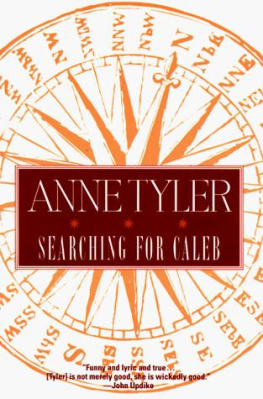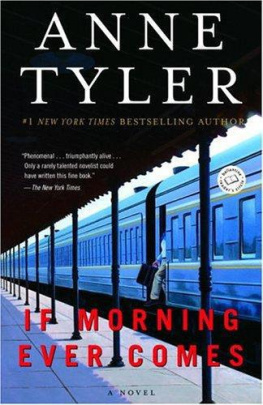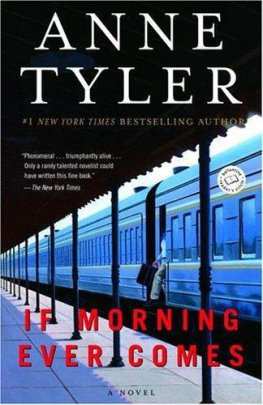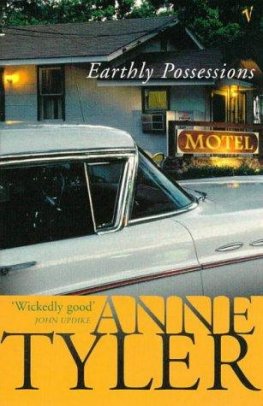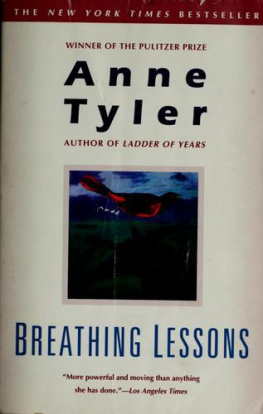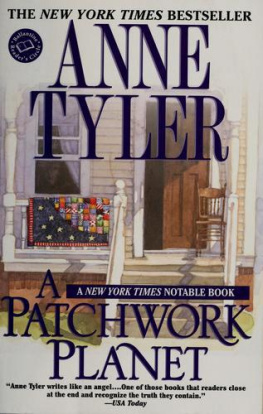Anne Tyler - The Tin Can Tree (Arena Books)
Here you can read online Anne Tyler - The Tin Can Tree (Arena Books) full text of the book (entire story) in english for free. Download pdf and epub, get meaning, cover and reviews about this ebook. year: 2007, publisher: Vintage, genre: Humor. Description of the work, (preface) as well as reviews are available. Best literature library LitArk.com created for fans of good reading and offers a wide selection of genres:
Romance novel
Science fiction
Adventure
Detective
Science
History
Home and family
Prose
Art
Politics
Computer
Non-fiction
Religion
Business
Children
Humor
Choose a favorite category and find really read worthwhile books. Enjoy immersion in the world of imagination, feel the emotions of the characters or learn something new for yourself, make an fascinating discovery.

- Book:The Tin Can Tree (Arena Books)
- Author:
- Publisher:Vintage
- Genre:
- Year:2007
- Rating:3 / 5
- Favourites:Add to favourites
- Your mark:
- 60
- 1
- 2
- 3
- 4
- 5
The Tin Can Tree (Arena Books): summary, description and annotation
We offer to read an annotation, description, summary or preface (depends on what the author of the book "The Tin Can Tree (Arena Books)" wrote himself). If you haven't found the necessary information about the book — write in the comments, we will try to find it.
The Tin Can Tree (Arena Books) — read online for free the complete book (whole text) full work
Below is the text of the book, divided by pages. System saving the place of the last page read, allows you to conveniently read the book "The Tin Can Tree (Arena Books)" online for free, without having to search again every time where you left off. Put a bookmark, and you can go to the page where you finished reading at any time.
Font size:
Interval:
Bookmark:
Annotation
In the small town of Larksville, the Pike family is hopelessly out of step with the daily rhythms of life after the tragic, accidental death of six-year-old Janie Rose. Mrs. Pike seldom speaks, blaming herself, while Mr. Pike is forced to come out of his long, comfortable silence. Then there is ten-year-old Simon, who is suddenly without a baby sister and without understanding why she's gone.
Those closest to this shattered family must learn to comfort them and confront their own private shadows of hidden grief. If time cannot draw them out of the dark, then love may be their only hope

After the funeral James came straight home, to look after his brother. He left Mr and Mrs Pike standing on that windy hillside while their little boy wandered in circles nearby, and the only one who saw James go was Joan. She looked over at him, but she didn't say anything. When he was a few steps away he heard her say, 'We have to go home now, Aunt Lou. We have to go down.' But Mrs Pike was silent, and all James heard for an answer was the roaring of the wind.
Going down the hill he took big steps-he was a tall man, and the steepness of the hill made him walk faster than he wanted to. It was too hot to walk fast. The sun was white and glaring and soaked deep in through the mat of his black hair, and his face felt slick when he wiped it with the back of his hand. Partway down the hill he stopped and took off his suit jacket. While he was rolling up his shirt sleeves he looked back at the grave to see if the others were coming, but their backs were still turned towards him. From here it seemed as if that wind hardly touched them; they stood like stones, wearing black, with their heads down and their figures making straight black marks against the sky. The only thing moving was little Simon Pike, as he picked his way down through the dry brambles towards James. Simon looked strange, dressed up. He had always worn Levi's and crumpled leather boots, but today someone had made him put his suit on. That would be Joan. Mrs Pike had looked at nothing but the ground for two days now, and couldn't notice what Simon wore. Joan would have polished those white dress-shoes that Simon was getting all grass-stained, and taken out the last inch of cuff on his sleeves so that they could cover his wrists. There was a thin faint line above each of his cuffs where the old hem had been; James could see it clearly when Simon came up even with him. He stood staring at the cuffs for a long time, and then he shifted his eyes to Simon's face and saw Simon frowning up at him, his eyebrows squinched into one straight line across his forehead and his mouth held tight against the wind.
Im coming too, he told James. His voice had a low, froggy sound; he was barely ten, but in a year or two his voice would begin to change.
James nodded and finished rolling up his shirt sleeves. There was a band of dampness beneath his collar. He loosened his tie and unbuttoned the top button of his shirt, and then he began walking again with Simon beside him. Now he went more slowly, bracing himself against the steepness of the hill. Each time he took one step Simon took two, but when he looked over at Simon to see if he was growing tired, Simon ignored him and walked faster. He wasn't sweating at all. He looked cold. James wiped his face on his shirt sleeve and followed him down between the rocks.
'Getting near lunchtime,' he said finally.
Simon didn't answer.
'Want to eat with Ansel and me?'
'Well.'
'Don't worry about your mother. I'll tell her where you are.'
Simon said something to his shoes, but James couldn't hear.
'What's that?' he asked.
'I wouldn't bother.'
'We'll tell your cousin Joan then,' said James. 'Soon as she gets back.'
The wind was so hot it burned his face; it made lulling sounds around his ears so that he couldn't hear his own footsteps. He pushed his hair off his forehead but it fell into his eyes again, hanging in a tangled web just at the top of his range of vision. Beside him, Simon was letting his hair do what it wanted. He had greased it down with something (it needed cutting, but Joan had been too busy with her aunt to see about that) and now it ruffled up in thick strings and stood out wildly in every direction. When James turned to look at him he nearly smiled. With his face sideways to the wind the roaring sound was quieter, so he kept looking in
Simon's direction until Simon grew uneasy.
'What are you staring at?' he asked.
'Nothing,' said James. 'Some wind we got.' He looked straight ahead again, and the roaring sound came back to hammer at his ears.
The ground they were treading was wild and weedy, with rocks sticking up here and there so white they might have been painted. There was no path to follow. Below them was the whole town of Larksville the main street hidden by trees, but the outlying houses and the tobacco fields laid bare to the sun. At the foot of the hill was the white gravel road where Simon and James both lived. They lived in a three-family house that looked like only a long tin roof from here. No houses stood near it. James's brother Ansel said whoever built their house must have been counting on Larksville's becoming a city someday, but Larksville was getting smaller every year. When anyone went away to college it was taken for granted they'd never be back again, not for any longer than it took to eat a Christmas dinner in the house they'd started out in. Yet the long crowded house sat there, half a mile from town as a bird flies and a mile by car, and its three chimneys were jumbled tightly together with the smoke intermingling in wintertime.
The sight of that green part of town was cool and inviting; it made James think of cold beers in the tavern opposite the post office. He looked down at Simon, but Simon was hunched into the jacket of his suit and he still seemed cold.
'Do you like sardines?' James asked him.
'Not much.'
'Or cold cuts?'
'No.'
They stepped through a tangle of briars, with the thorns making little ripping sounds against their clothes. 'I could eat a pizza,' Simon said.
'You better talk to Ansel, then. He makes pizzas.'
Simon tripped and caught himself. He looked down at the small rock that had tripped him and then began kicking it ahead of him down the hill, swerving out of his course to recover it every time the rock rolled sideways. Grey streaks began to show on his shoes, but James didn't try to stop him.
When they reached the gravel road they turned right and began heading in the direction of the house. Simon's rock rolled into a ditch; he left it lying there. It looked as if they might get all the way home this way not talking much, and not saying anything when they did talk, just as if this were an ordinary walk on an ordinary day. That suited James. He had been thinking too much, these last two days -turning things over and over, figuring out how if just some single incident had happened, or hadn't happened, things might have been different. Now he ached all over, and thinking made him sick. He was just beginning to feel easier, ambling along in silence beside Simon, when Simon turned and began walking backwards ahead of James, fixing his frowning brown eyes on a point far down the road. He opened his mouth and closed it, and then he opened it again and said, 'James.'
'What.'
'How far down in the ground before it starts getting cold?'
'Pretty soon,' said James.
'How soon.'
'Pretty soon.'
'I'm just thinking,' Simon said.
To keep him from thinking any more, James said, 'But then it gets hot again, down towards the centre of the earth. That's beyond digging distance.'
Next pageFont size:
Interval:
Bookmark:
Similar books «The Tin Can Tree (Arena Books)»
Look at similar books to The Tin Can Tree (Arena Books). We have selected literature similar in name and meaning in the hope of providing readers with more options to find new, interesting, not yet read works.
Discussion, reviews of the book The Tin Can Tree (Arena Books) and just readers' own opinions. Leave your comments, write what you think about the work, its meaning or the main characters. Specify what exactly you liked and what you didn't like, and why you think so.

